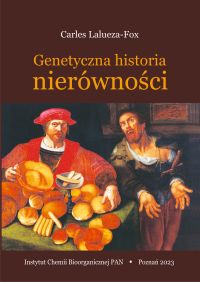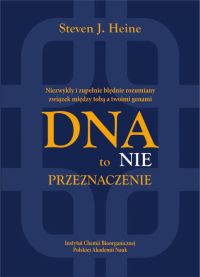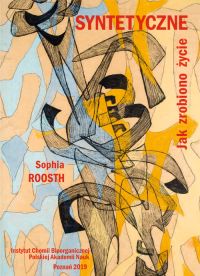Current issue
Online first
Archive
About the Journal
Editorial Office
Editorial Board
Publisher
Reviewers
Editorial policies
Ethical standards and procedures
Abstracting and indexing
Contact
Subscription
Instructions for authors
Article processing charge (APC)
English language editing services
Books and Events
Books
Events
Books
Visit the Institute of Bioorganic Chemistry PAS Online Bookstore and Dive into a World of Knowledge!
Explore the IBCH PAS Recommends book series. Polish translations are available in our Institute's online store. Click here to get your copy. If you read in English, we highly encourage you to explore the original editions—they are truly worth it!



Explore the IBCH PAS Recommends book series. Polish translations are available in our Institute's online store. Click here to get your copy. If you read in English, we highly encourage you to explore the original editions—they are truly worth it!
CARLES LALUEZA-FOX
Genetyczna historia nierówności | Inequality: A Genetic History

For over a decade, the world has been watching with bated breath, and often astonishment, as archaeogenomics reveals new facts about the biological history of humankind. As a result, we have begun to realize that our conceptions of the past are not always confirmed by hard genetic data. Carles Lalueza-Fox's book represents another milestone on the challenging journey of discovering the truth about ourselves and the civilization we have created. It shows that archaeogenomics is a source of information not only about our origins and past migrations but also about interpersonal relationships. The picture emerging from these studies is rather bleak, indicating that inequality and injustice are fundamental elements around which human communities have formed at all levels of their organization, from the family to the state. The book exposes a series of phenomena hitherto unnoticed or overlooked in so-called official history, thus providing an important voice in the ongoing global debate on fundamental human values and rights. | Marek Figlerowicz
STEVEN J. HEINE
DNA to NIE PRZEZNACZENIE. Niezwykły i zupełnie błędnie rozumiany związek między tobą a twoimi genami | DNA Is Not Destiny: The Remarkable, Completely Misunderstood Relationship between You and Your Genes

Although the whole sequence of the human genome has been known for almost 20 years, we still cannot read it with comprehension. To what extent does this result from a lack of knowledge, and to what extent from our biases and stereotypes? Is the information encoded in the genome sequence unambiguous, and will we ever be able to decipher it completely? Steven J. Heine poses many other fascinating questions in his book. It is worth acquainting oneself with it, even if we do not receive satisfying answers to all the questions. I highly recommend this book to readers interested in how human-made culture influences the understanding of their biology. | Marek Figlerowicz
SOPHIA ROOSTH
Syntetyczne. Jak zrobiono życie | Synthetic: How Life Got Made

Sophia Roosth is a cultural anthropologist at the Department of the History of Science at Harvard University. She is not a biologist or biochemist, as the title of the book might suggest. Unlike classical anthropologists who studied the customs of distant tribes, the author spent a few years in MIT laboratories, observing the tribe of synthetic biologists. She was interested not only in what they do but, above all, in what they believe, how they perceive the world, and how it affects the way they conduct science. Therefore, this book is not a textbook for those wishing to engage in synthetic biology. It intrigued us for entirely different reasons. Firstly, it shows how exceptionally innovative research is conducted in leading scientific centers, how theories and research approaches are created, and how old mental frameworks are challenged and new ones are created. Secondly, it shows what questions, doubts, and concerns arise from any ideas and actions aimed at improving or modifying the products of nature. The highly dynamic development of life sciences in recent years requires a broad discussion, preparing contemporary societies for a better understanding of the practical implications of many breakthrough discoveries. This book is an excellent introduction to such considerations, as it demonstrates how varied and unexpected reactions can be to new possibilities offered by medicine and biotechnology. | Marek Figlerowicz
We process personal data collected when visiting the website. The function of obtaining information about users and their behavior is carried out by voluntarily entered information in forms and saving cookies in end devices. Data, including cookies, are used to provide services, improve the user experience and to analyze the traffic in accordance with the Privacy policy. Data are also collected and processed by Google Analytics tool (more).
You can change cookies settings in your browser. Restricted use of cookies in the browser configuration may affect some functionalities of the website.
You can change cookies settings in your browser. Restricted use of cookies in the browser configuration may affect some functionalities of the website.

